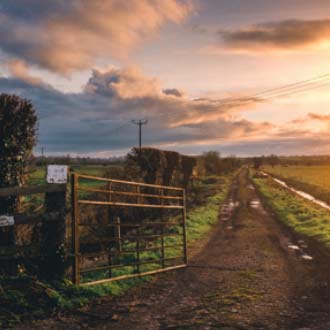Farm marketing tips for a diversification project
Jonathan Birch is Creative Director at the digital marketing agency Glass Digital. Here, he shares his top tips on farm marketing for a diversification project, so you can ensure you make the most of the opportunity.
In order to build a range of revenue streams, they can rely on, more and more farmers are finding news and interesting ways to make money on their premises. In fact, according to Savills' Farm Diversification Report from November 2019 [PDF], 45% of farms now rent out their buildings for non-farming use, and 22% of all farms' income comes from diversification projects. This is only set to continue, as a lot of farmers are finding it increasingly difficult to make enough money through traditional means.
Whether you've started to rent one of your barns out as an Airbnb, you offer farm experience days for kids, or you've built an artisan cheese line from the ground up, it's important you know how to market your project properly. This is the only way you'll truly get the most out of it. Here, I'm going to share my top marketing tips that will help to make your farm diversification project a success.
 Make a Google My Business listing, and keep it updated
Make a Google My Business listing, and keep it updated
When you use Google to search for the likes of restaurants or hairdressers near you, you might notice that a box listing some of the most relevant businesses, along with their key details, will pop up on the right-hand side of the search engine results page (SERP). This is called a Google My Business listing, and it's well worth setting one up for your new venture.
This feature will be displayed to those in your area who are looking for the products or services you offer. It allows you to input your opening times and address, share photos that are relevant to your project, and will even display reviews from your previous customers. As well as offering all of the information people who are specifically searching for your business might be after, it's also very effective for helping new people to find you.
Make SEO part of your strategy
Search engine optimisation — or SEO — is an area of digital marketing that's neglected by a lot of small business owners in the early days of setting up their venture. However, it's a long-term commitment, which means it's best to start as early as possible.
The goal of SEO is to help your website rank better on Google's SERPs for queries that are relevant to your business. So, for example, if you're based in North Yorkshire and want to start renting your barn conversion out for weddings, you'll want to show up for searches such as "barn conversion wedding North Yorkshire" or, if your farm has started to make cheese and you're looking to sell it online, you'll want to rank for queries such as "farmstead cheese" and "buy artisanal cheeses online".
There are three main elements to any successful SEO strategy: content, link-building, and technical SEO. This is because everything from writing high-quality guides to ensuring your site offers a positive experience can have an effect on how well your website is ranked by Google and other search engines. Many business owners choose to outsource their SEO efforts to an agency, as there are so many guidelines to navigate, and it can take a lot of time and effort to see results.
Don't feel like you need to be on every social media platform
In the early days of establishing your new project, it's easy to feel like you need to be on every social media platform possible in an effort to reach absolutely everyone. However, this usually isn't the most effective approach to take — prioritising quality over quantity is always best. So, rather than setting up 10 different accounts that you don't really have time for, choose two or three that are going to be the most useful, and stick with them.
If you're trying to reach an older demographic, Facebook is typically the best place to be. On the other hand, if you're looking to promote your products or services to the younger generations, Instagram and Snapchat are where you're most likely to find them. Then, focusing on the best possible content for the small number of channels you've chosen should help you to gain as much engagement and as many conversions as possible.
It can be difficult to work out how to market a brand-new business venture, but taking these tips on board should really help. By setting up a Google My Business listing, giving SEO a go, and focusing on the social media platforms that make the most sense for your business, you can really help to ensure your diversification project is a success.
- Log in to post comments

